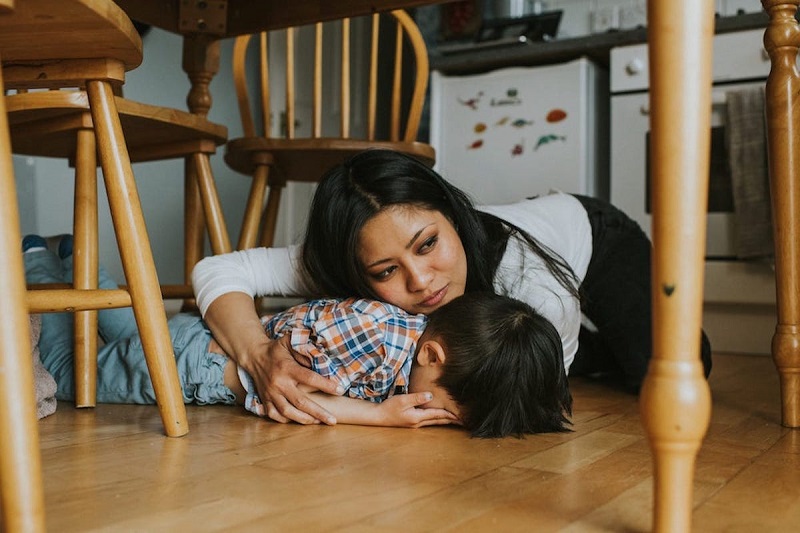If your Instagram feed is anything like mine, you hear a lot about “gentle parenting.” It sounds promising. After all, based on the name, it would appear the alternative is something like “harsh parenting,” which I may occasionally veer into but would certainly like to avoid. On the flip side, it’s been hard to miss the pushback (as in here, here, and here).
As is my general approach to these things, my angle into it is data. What does the evidence say about this trend?

Digging into the data proved to be difficult. The most basic problem is that this approach to parenting isn’t especially well defined, which makes it hard to formally evaluate. I’ll say more on this below, but in Cribsheet I wrote about evidence-based approaches to discipline (focusing on programs like 1-2-3 Magic, Triple P–Positive Parenting, and The Incredible Years). Much of the data is based on specific programs: we can evaluate them because they are a specific combination of activities. Gentle parenting is a more nebulous approach, so even the concept of evidence is more complex.
I am almost daunted, but today I’ll make an attempt to talk through this trend with the lens of data. I’m going to do three things. First, I’ll step back and look at what the evidence overall suggests are key components of a successful behavioral management approach. Second, I’ll discuss the evidence on gentle parenting specifically. Third, I’ll briefly touch on the question of time-outs, which I have written about in more detail before. Finally, I will sum up. For more of a TL;DR, skip to this last section.
Before we get started: I worry a little bit that this will be read as a negative take on gentle parenting. In my own parenting life, however, I have found many of the tools and scripts extremely useful. My younger child does respond well, at least some of the time, to a script that acknowledges anger and feelings. I’ve taken a lot from the idea of using questions as a way into hearing how my kids feel. These are all part of the gentle parenting landscape. At the same time, I have also made use of approaches from 1-2-3 Magic that, yes, involve some time-outs. The ultimate message is about finding what works for you.
Big picture
There are a number of evidence-based parenting interventions. I say “evidence based” because these are programs that have been evaluated in randomized controlled trials and shown to be effective at improving parent-child interactions for young children. These are not gentle-parenting-specific interventions, but the broad lessons that come out of them are extremely consistent with much of the gentle parenting rhetoric. So I think there is little disagreement on these points (I mean, it’s parenting, so there is always some disagreement).
Here are three key shared elements:
- Recognize that your child is not an adult and, as such, your expectations and reactions shouldn’t be as if they were. If your 4-year-old throws an enormous tantrum about wearing their purple pants, and then as soon as you put them on, they decide that purple makes them want to vomit and they cannot possibly wear these pants even though you are now very, very late for preschool, there is a temptation to be like What the fuck is the matter with you? This would, in fact, be the appropriate reaction if this was the behavior of your spouse. But kids aren’t adults, and getting angry at the irrationality is not going to improve the situation.
- Related to 1: getting angry, yelling, or any type of physical aggression or violence isn’t likely to be effective. There is a large body of literature on physical punishments in particular, e.g. spanking, showing that they actually worsen later behavior. To surface my personal views: I do not believe in spanking, completely independent of anything in the data. But in this case, that is supported by research findings.
- Finally: all of these approaches emphasize the importance of consistency around rewards and consequences. Children react well to knowing what to expect. Whatever system for behavior modification/discipline you are going to adopt, it should be one that you (and everyone else in the caregiving sphere) can follow through on. If this is a system with warnings and time-outs, you follow through on them every time. If it’s a system more focused on discussion and joint resolution of conflict, you do that every time. This is similar to messages we give about sleep training or potty training or anything else. There are many approaches that can work; the key is to pick one you can stick to.
Okay, so that’s the big picture. Now let’s get into the gentle parenting evidence.
Evidence on gentle parenting
A complication of the data-based approach here is that gentle parenting isn’t a well-defined system. It’s not easy to identify a single source of the idea or where it came from. Jess Grose put it well: “a sort of open-source mélange, interpreted and remixed by moms across the country.” This makes it hard to evaluate in a formal way or produce data similar to what we have for approaches like 1-2-3 Magic.
Gentle parenting is a collection of behaviors or approaches that focus on being responsive, taking children’s feelings seriously, setting and holding boundaries, and trying to deal with difficult behaviors with discussion rather than punishment. It is worth noting that a lot of what is discussed in the rubric of gentle parenting is exactly the same as what is emphasized in these other positive parenting approaches. Understanding that kids are not adults. Not getting angry. Being consistent. No hitting.
The lines are, therefore, a bit blurry. But as I read more, things came into focus. The key differentiators: no time-outs (or similar time-out-like punishments) and no rewards (no sticker charts, etc.). In place of these, there are (often very thoughtful) scripts that acknowledge children’s feelings and attempt to work through them.
Not: “Please do not throw the marbles at the window. That’s a warning… That’s a second warning… That’s a time-out.” But rather, a version of: “Wow! You are really angry and want to throw something! The problem is, windows are delicate. Would you like to throw a pillow on the floor or stomp your feet?” Rather than: “If you get ready quickly, you can have five minutes of screen time,” we get to something like making it a game: “Do you think you can put on your jacket and shoes with your eyes closed?”
Given these key differentiators, I went looking for evidence that would allow us to identify whether these scripts were more effective, or produced better long-term outcomes. The simple reality, though, is that data is extremely limited.
I found, for example, this article, which ends by saying gentle parenting is evidence-based and lists a long string of benefits: happier parents, smarter kids, better emotional health, and so on. (It reminded me strongly of the lists of breastfeeding benefits.) When I looked at the linked evidence, though, it was both difficult to interpret and not directly focused on gentle parenting practices specifically.
For example: the paper cited to support the claim that parents are happier with this method of parenting is one where parents filled out surveys about how child-centric their parenting was and how happy they were. Parents who were more child-centric were happier. Putting aside the obvious causality issues here, this also isn’t very specific to any particular parenting approach. Or this paper, which argues that authoritarian — as opposed to “authoritative” — parenting styles from mothers were associated with greater lying and alcohol use in children. But many parenting styles are in the “authoritative” group, including things that wouldn’t fall under the gentle parenting rubric.
I didn’t find anything in the literature that was able to look specifically at the efficacy of the features that distinguish gentle parenting from these other “positive parenting” approaches. There is plenty of data showing that these approaches work better than (say) spanking. But there isn’t anything concrete in the data that would argue for the supremacy of gentle parenting.
I want to be clear that the converse is also true. There is nothing here that suggests the primacy of any other approach in this space! The data we have is simply not complete enough to distinguish.
Time-outs
It is important to address time-outs. Time-outs (or similar) are a key part of many parenting behavior systems and explicitly not a part of the gentle parenting approach. An oft-made argument is that time-outs are bad (e.g. here and here), that they cause children trauma, and that it is necessary therefore to adopt a parenting style that does not include them.
There are many, though, who have argued against that. This paper, for example, does a fairly extensive literature review on parenting interventions and argues that the literature suggests time-outs can be an effective and non-problematic part of discipline. This paper makes a similar claim.
These papers talk about time-outs as a part of a larger discipline approach. They are far from a solution on their own, but they have been used as part of successful, “evidence-based” parenting interventions for decades. I know that there are reasonable people who believe these approaches are problematic, but there simply isn’t any good evidence that this is the case. I know there are those who argue that we cannot be sure and, as a result, should not use them. But the same could be said about virtually any choice we make in parenting.
Does this mean you have to use time-outs? No, it does not. Time-outs do not feel right to some people. And if they do not feel right to you, do not use them. Personally, we use them, but sparingly. We’ve found, in fact, that the time a child spends alone is restorative.
The “roll-your-own” conclusion
The last point here, on time-outs, echoes what I think is the larger takeaway from this. If we want to be taking a data-based approach to these parenting practices, we should start with what we know from data. Which is: don’t hit, try not to yell or get angry, and be consistent. The thing is, there are a lot of different ways to do this that would cover all these bases.
As with almost everything in parenting, there is a tendency to try to adhere to a type. I want to be an attachment parent. I want to be a free-range parent. I want to be a tiger parent. The reality, of course, is that you don’t have to adhere to type, since your parenting journey is your own. You can take parts of these approaches and make them work for you.
What does it mean to make them work for you? The main thing — coming back to the data — is finding something that you can do consistently. Find an overall approach that you’ve thought about in advance and that is implementable. This may mean taking something and slightly modifying it. For example: we used a version of 1-2-3 Magic with my kids, but we could not bring ourselves to use the language “1, 2, 3.” We came up with “That’s a first warning, that’s a second warning…” since it felt like something that worked for us.
Or it could mean doing something that is a more radical departure, taking some pieces of one approach and some of another. Doing a version of Incredible Years but without time-outs or, on the flip side, taking some of the excellent scripted lessons from gentle parenting (here’s an app!) but adding in your own version of consequences. It may be that some of the components of the gentle parenting approach really appeal but the realities of life make them difficult to follow through on. The advice to pull the car over when your children are fighting and start going again only when they stop may not be practical for many people. And doing this inconsistently will be worse than consistently doing something else.
In the end: find what works for you and roll your own (within the evidence!). Got thoughts or advice on this? Add it in the comments…
Community Guidelines















Log in
Thank you so much for writing about this. Gentle parenting is particularly problematic when the “experts” demonize other parenting approaches and then try to sell expensive workshops and subscriptions (Dr. Becky) to desperate parents. I use some of her scrips occasionally but have added positive reinforcement and timeouts. My kids also need consequences. Gentle parenting just makes my strong willed child’s behavior a million times worse because constantly talking about feelings is giving too much attention to his problematic behavior. I was inadvertently reinforcing it. I think because gentle parenting lacks a framework it is very easy to fall into permissive parenting out of fear of emotionally damaging our children. I still don’t agree with harsh punishment but to fear monger consequences is crazy. Gentle parenting is not for my family and I am so glad Emily is discussing the data (or lack there of).
I appreciate this post very much because I think it’s so important to combine data with what feels best — since data cannot answer every parenting question, despite what we might wish.
However, one piece of advice in the post that I would quibble with is “try not to get angry”. I think that’s a very difficult goal, and it doesn’t set a realistic example for our children. Instead, I would argue that it’s important to try to manage our emotions as best we can and model repairing when our emotions get the best of us. That feels like a more realistic goal for most people (who never gets angry?!) and helpful for teaching kids how to make it right when they express their feelings unproductively.
The other reality that I’m realizing I never saw in the literature (and my oldest is 11!) is that not every parenting style works with every child. My oldest is a pleaser, so once we make our expectations known and have some natural or time out consequences to not meeting those expectations a few times, she gets it and we move on. My 2nd child with a touch of the ADHD, that doesn’t work for. She struggles with eating anything we put in the table for her and chores. No amount of time outs, consistency, clear expectations, or anything else has worked. All of these normal parenting tactics lead her into a rage spiral from which it is hard (for all of us!) to recover so we’re exploring the possibility that she needs to be parented differently and trying to figure out what that looks like. But it’s really thrown us for a loop and has been incredibly hard as no parenting system I’ve come across ever seems to allow for the fact that it might not work for everyone.
Yes, it’s of limited use to identify the statistically most effective methods of things like discipline because individual children vary so much. The statistically best method might be completely wrong for your kid.